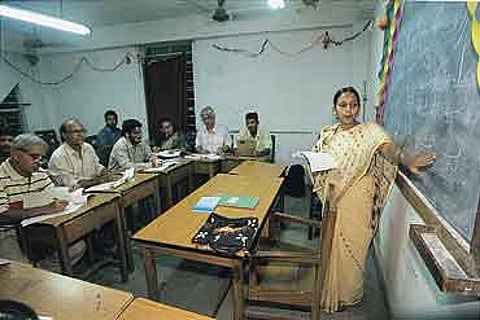Alif For The Bhadralok
Bengalis, from city and kasbah alike, are falling for the gentle tug of Urdu literacy

Those who have completed, or have enrolled, for the diploma course include doctors, engineers, housewives, school and college teachers, government employees, businessmen and journalists. For most, it’s the passion for the language that’s driven them to the academy. A few, though, want to learn Urdu for practical reasons. "Learning Urdu will help me in my PhD programme since I’ll be able to read and comprehend a lot of Urdu source materials," says Leena Sarkar, a lecturer in History at the Milli Al-Ameen College in Calcutta. Tridip Mustaphi, an orthopaedic who’s involved with anNGO that works in Muslim-dominated rural areas, says: "Many of the people in the areas I go to are Urdu-speaking; it’ll help a lot if I can communicate with them in their language. Reading Urdu literature is of secondary interest to me."
Many are from small towns in Bengal, like Pranab Acharya, additional district sub-registrar of North Dinajpur, a few hundred kilometres north of Calcutta. "I want to be able to recite shairi and want to write in Urdu," says Acharya, who has enrolled for the diploma course this year and plans to attend contact classes at the nearest study centre at Malda, 95 km from his town, at least once a week. Ditto for Soma Mukhopadhyay, a lecturer in electronics at the Chandannagore Polytechnic College about 60 km from Calcutta who plans to travel that distance three times a week to attend the contact classes.
But then, Mukhopadhyay, Acharya and others like them are merely following an old Calcutta tradition. This city was, from the early 19th century till a few decades ago, the prime centre for Urdu. "Calcutta evolved as the primary centre for learning, research and enrichment of Urdu due to a number of reasons," says Urdu scholar Fayez Ahmed Khan. "The Fort William College gave a boost to Urdu and many scholars settled here from various parts of the country. This was the capital of British India till 1911. Also, when the families of Nawab Wajed Ali Shah and Tipu Sultan settled here in exile, exponents of Urdu literature in their courts followed them. Bengalis, be they Muslims, Hindus or Christians, were great lovers of art and culture and patronised the language. Calcutta was known as a centre of excellence for Urdu and many prominent Bengali Hindus were renowned scholars in the language." Bangla may be in no danger of being read right to left, but its speakers are certainly leaning that way.
Tags